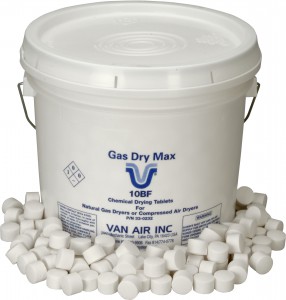Natural Gas Dehydration, Fuel Gas Conditioning, Instrument Gas Drying
Natural gas emerges from the ground with little resemblance to the clean dry fuel used in our homes and power plants. Many contaminants are present in raw natural gas including water vapor, which can cause a range of problems. These problems include the freezing of regulators and pipes, hydrate formation, liquid accumulation in pipeline low points, and failure to meet the contractual moisture requirements at points of sale.
Removing water vapor from natural gas—dehydration—is mostly accomplished at centralized plants fed by many wells and pipeline gathering systems. Glycols and solid adsorbents are applied in these plants to remove water vapor from the gas.
In some cases, however, an operator needs to dehydrate natural gas upstream of the central plant. Remote gas dehydration cannot be accomplished easily using the technologies that are used in central plants. Too many utilities are required and equipment capital costs are often prohibitive.

10BF is the most effective deliquescent desiccant from Van Air Systems. Formulated primarily for the dehydration of natural gas for use in Van Air Systems Pipeline Dryers.
That’s where Van Air Systems comes in. Our proprietary gas dehydration process uses absorbent tablets called deliquescent desiccant. These tablets extract humidity from the gas stream by chemical absorption. It is a batch process that requires little more than one or two pressure vessels. There are no moving parts or utility requirements. The simplicity of the drying process allows for dehydration at wellheads, compressor stations, and other remote locations. Relative humidity levels as low as 4% can be achieved.
Typical applications include fuel gas conditioning, instrument gas drying, and water dew point control to prevent condensation in buried lines. Depending on the gas pressure and temperature we can also meet pipeline sales specifications as low as 4 lbs. of water vapor per MMSCF.
In some cases, our process has also been used as a direct substitute for glycol-based dehydration units, deliquescent desiccant gas dryers (Van Air Systems Pipeline Dryers - PLD Series) do not use a re-boiler and therefore do not produce air emissions.
Call 1-800-840-9906 or email us to learn more about gas dehydration and which products would benefit your application.
